Talent Attraction and Retention
Talent Attraction and Retention
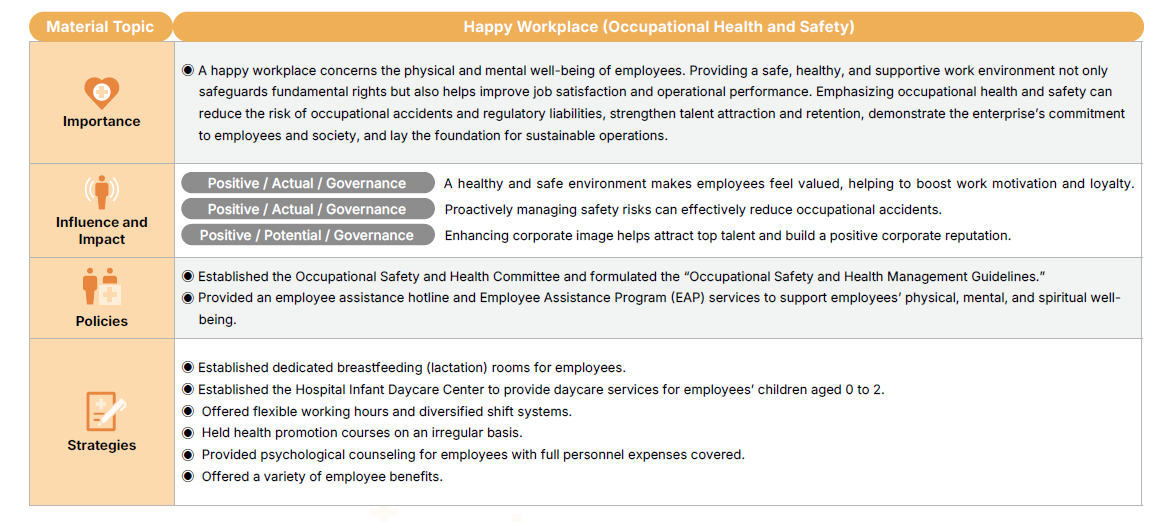
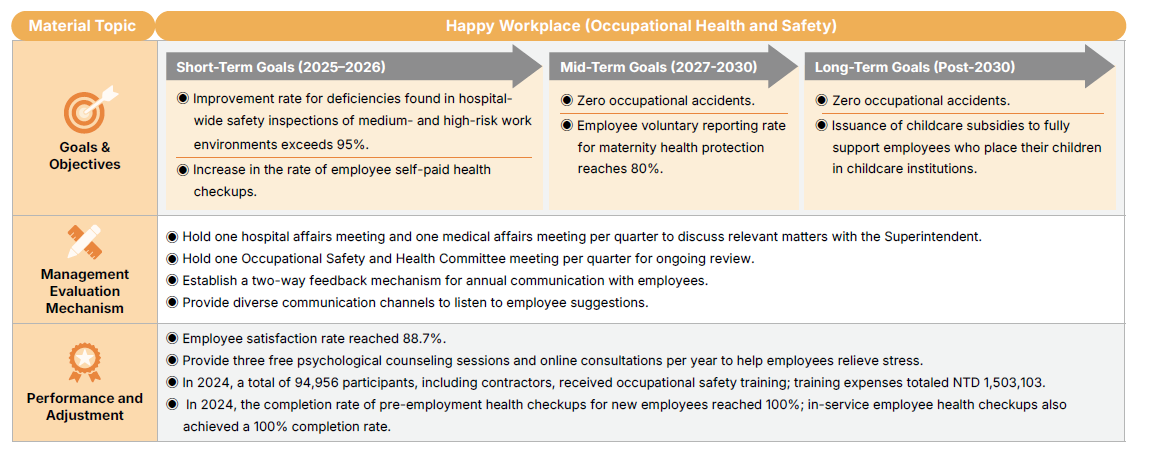
Diverse Employment
-
Employee Statistics
NCKU Hospital is committed to creating a diverse and inclusive working environment. We firmly believe that talents from different backgrounds, professions, and experiences can bring diverse perspectives and innovative momentum to medical services, thereby enhancing the overall quality of care and organizational resilience. As of the end of 2024, the total number of NCKU Hospital employees, including part-time staff, reached 5,047, covering physicians, nurses, allied health professionals, project-based research assistants, and part-time personnel. In addition, there are seven categories of non-employee workers—general affairs, supply, engineering, equipment, information, laboratory, and caregiving service personnel—all of whom operate through labor outsourcing or procurement projects, totaling 95 contracts. The total number of non-employee personnel throughout the year was 393, an increase of 1 person compared to 2023, indicating stable overall headcount.
Furthermore, according to statistics, NCKU Hospital has continuously focused on the employment of minority and disadvantaged groups over the past three years, with hires spanning different age groups and genders. In 2024, the Hospital employed a total of 137 staff members from disadvantaged groups.
NCKU Hospital also places importance on local engagement and the development of regional talent. All members of the Hospital’s senior management are local residents. By hiring management personnel with local backgrounds and professional expertise, the Hospital strengthens its understanding of and response to local needs, promoting localized organizational governance and the fulfillment of social responsibilities. In addition, the Hospital adheres to the relevant provisions of the Indigenous Peoples Employment Rights Protection Act to ensure that the employment rights of Indigenous staff are properly safeguarded and respected, thereby fulfilling the sustainable values of workplace equity and social inclusion.
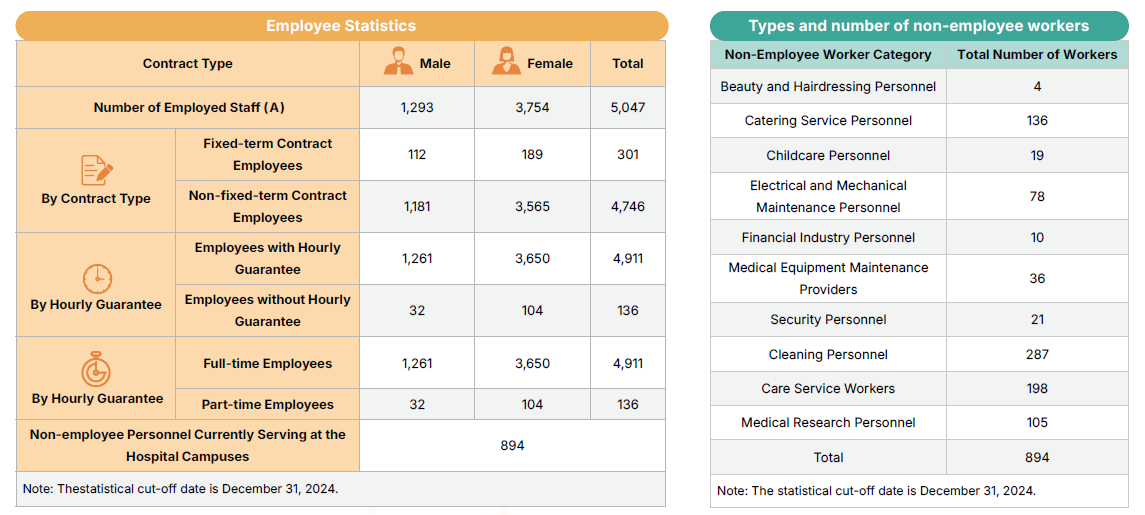
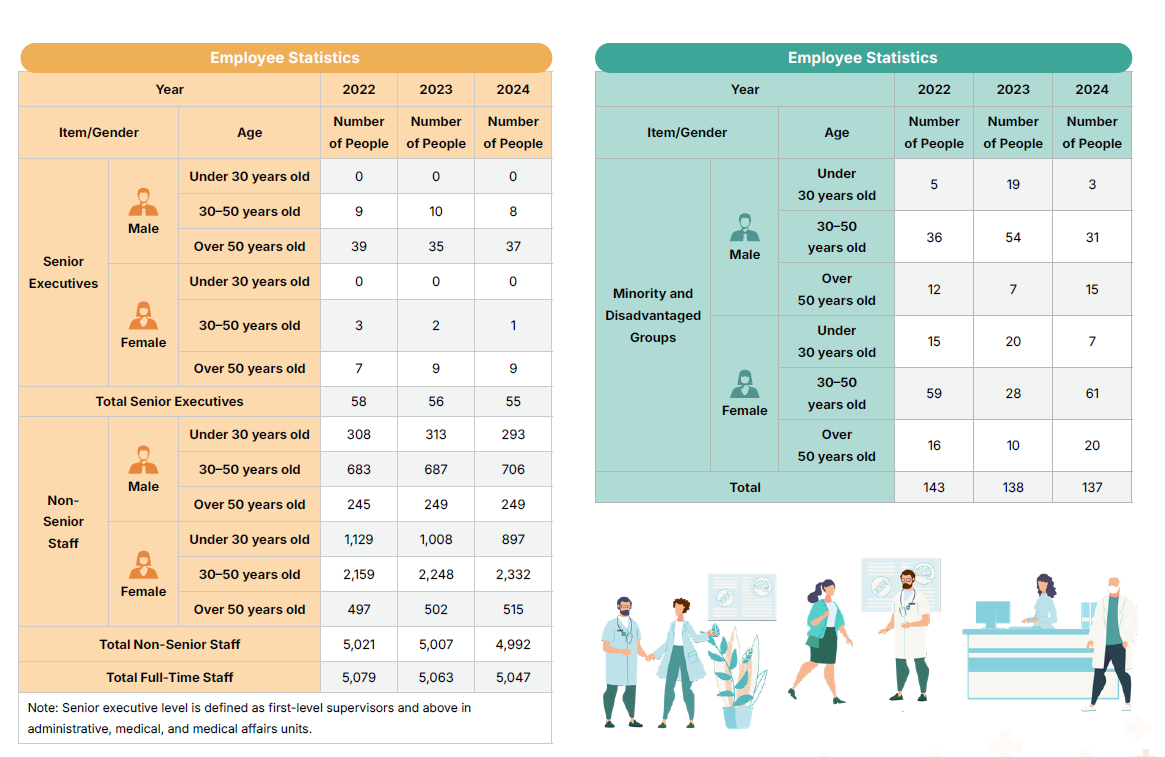
-
New Hire and Turnover Rates
As of the end of 2024, NCKU Hospital had 1,252 new employees, with a total new hire rate of 24.81%, an increase of 2.21% compared to 2023. In addition, 657 employees left the Hospital, with a total turnover rate of 12.02%, showing little change from 2023.
The Hospital complies with relevant provisions of the Labor Standards Act. In the event of a major operational change or the termination of an employment relationship, the employment contract with the employee is terminated in accordance with government regulations, with the notice period as follows:
- Employees who have worked for more than three months but less than one year: 10 days’ notice.
- Employees who have worked for more than one year but less than three years: 20 days’ notice.
- Employees who have worked for more than three years: 30 days’ notice.
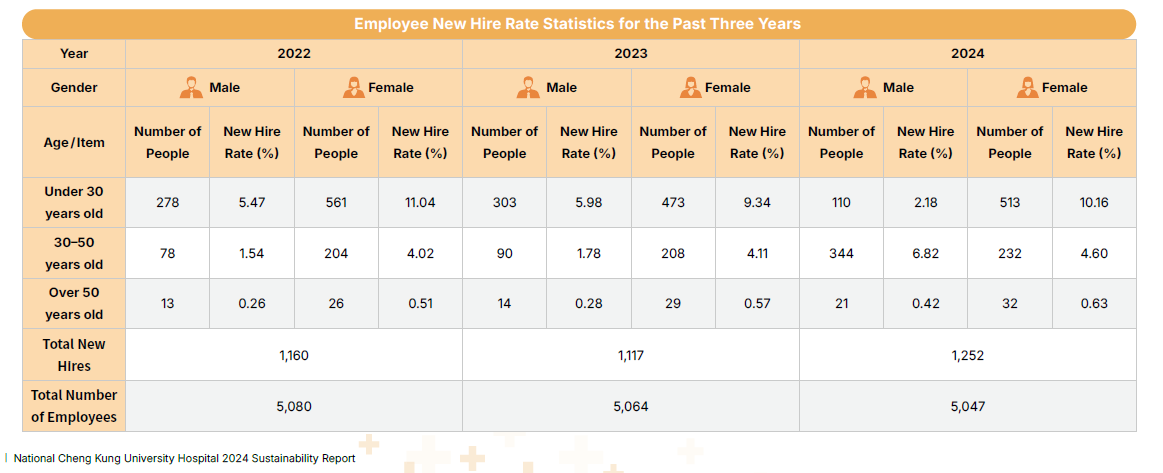
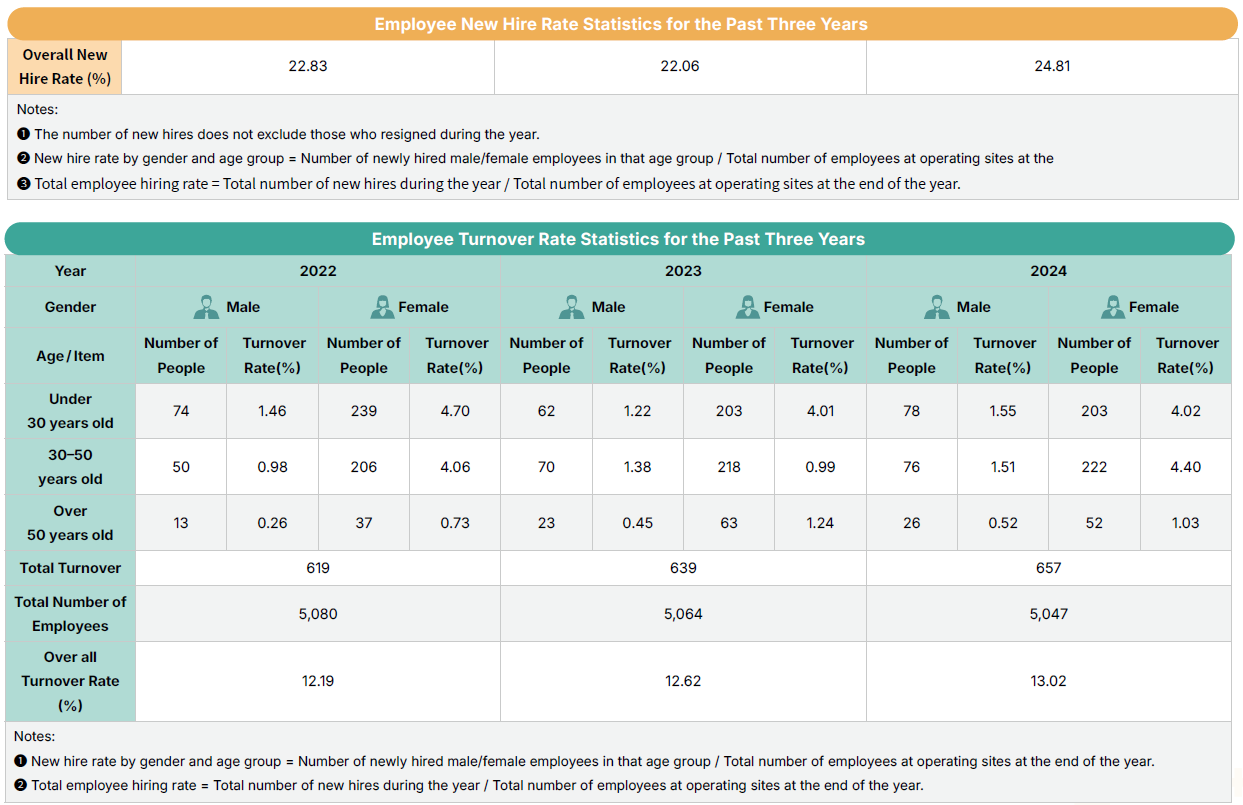
-
Promotion and Evaluation
NCKU Hospital has established a “Personnel Review Committee,” which holds regular meetings in accordance with organizational regulations and maintains complete meeting records. The Hospital also implements appropriate rewards and penalties based on employees’ specific performance, and compiles such cases as references for the Performance Evaluation Committee. Disciplinary and reward measures are executed based on the results of year-end performance evaluations.
The Hospital’s promotion and evaluation system—covering system revisions, personnel promotions, and reward and penalty procedures—are reviewed by relevant committees, with participation from grassroots employee representatives to ensure procedural fairness and diversity of perspectives. The evaluation process is transparent and includes a two-way feedback mechanism.
For those whose performance is evaluated as unsatisfactory or below job requirements, the Hospital assigns the responsible unit to provide guidance and support, recording the guidance process and improvement plans for subsequent monitoring and tracking. Additionally, the Hospital offers continuing education and learning resources according to employee needs to support career development and professional growth. A comprehensive and motivating system helps improve the quality of medical services, strengthen organizational cohesion, and realize goals of people-centered care and sustainable development.
Furthermore, high-performing contract medical personnel may participate in public recruitment to be appointed as official public medical personnel; outstanding public servants may also be promoted to supervisory positions according to internal promotion procedures, establishing a motivating and developmental career pathway. In 2024, 100% of employees underwent evaluation, and the relevant regular evaluation information is as follows:

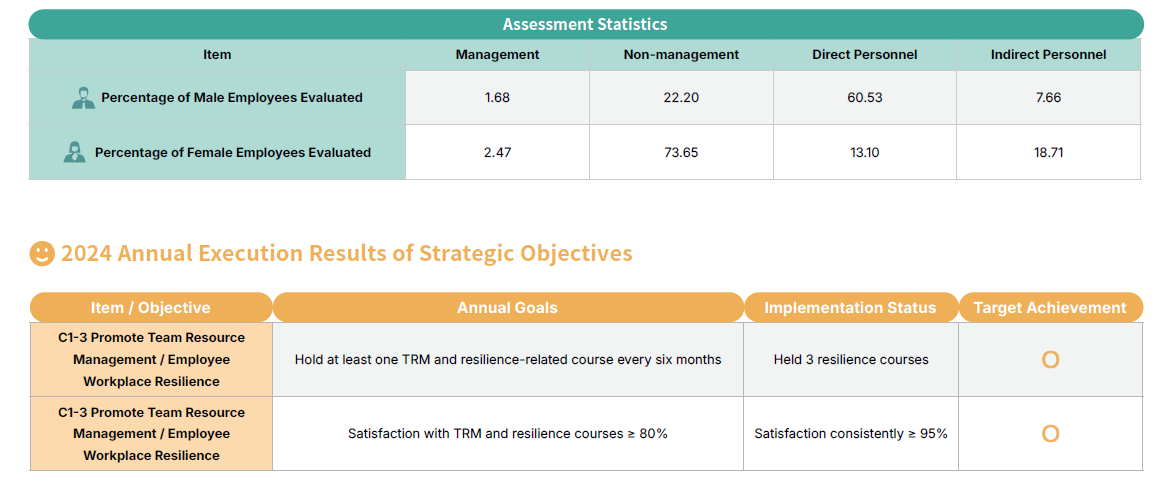
Addressing Medical and Nursing Staff Shortages
The overall employee satisfaction rate at NCKU Hospital is 88.7%, slightly below expectations. Possible reasons include unmet expectations regarding salary and bonuses, as well as increased workload. Moreover, the satisfaction rate for fatigue management among medical and nursing personnel is 83.6%, indicating room for improvement. This may be due to ongoing manpower attrition, which increases the workload and working hours of existing staff, thereby affecting job satisfaction and physical and mental health. To address the shortage of medical and nursing staff and enhance retention, the Hospital has implemented the following seven measures.

-
Human Resource Strategy
To safeguard occupational health and employment rights, NCKU Hospital has established the “Employee Rights Policy,” which covers employment non-discrimination, workplace safety and hygiene, reasonable working hours, gender equality, employment protection for Indigenous peoples and persons with disabilities, collective bargaining, and grievance mechanisms. The Hospital disseminates this information through multiple channels including the knowledge management system, personnel bulletins, and public websites to help employees understand and exercise their rights. A comprehensive and transparent system is in place to regularly review and revise work regulations, with grassroots employee representatives participating in the revision process to ensure diverse opinions are included in decision-making. Personnel at all levels have a clear understanding of their responsibilities and delegated authority and implement them accordingly. The Human Resources Department regularly examines reasons for employee resignation, salary structures, and leave implementation. Through continuous improvement, the Hospital aims to enhance employee well-being and organizational stability.
-
Compliance with Labor Regulations and Protection of Work Environment
As a medical institution, the Hospital operates 24 hours a day without interruption to meet healthcare service demands. In accordance with Article 32, Paragraph 4 of the Labor Standards Act, when employees are required to work overtime due to natural disasters, incidents, or emergencies, the Hospital notifies the enterprise union within 24 hours of the commencement of extended work and subsequently provides appropriate rest. For civil servants, the Hospital complies with Article 4 of the “Regulations on Civil Servants' Work Attendance for the Executive Yuan and Its Subordinate Central and Local Agencies,” which stipulates that, except in cases involving the rescue of major disasters, handling of emergencies or major incidents, or the implementation of major projects, the daily working hours shall not exceed 14 hours, and the total extended working hours in a month shall not exceed 80 hours. In the event of overtime beyond these limits, the Hospital reports the situation to the Ministry of Education within one month from the date of occurrence. Furthermore, the Hospital strictly adheres to Article 45 of the Labor Standards Act and does not employ child labor under the age of 15.
-
Accessible and Diversified Reporting Channels
The Hospital provides multiple reporting channels, including the “Superintendent’s Mailbox,” the “Cheng Kung Window Employee Feedback Platform,” and the “Employee Communication Corner” in the personnel system, to allow both external customers and employees to voice concerns.
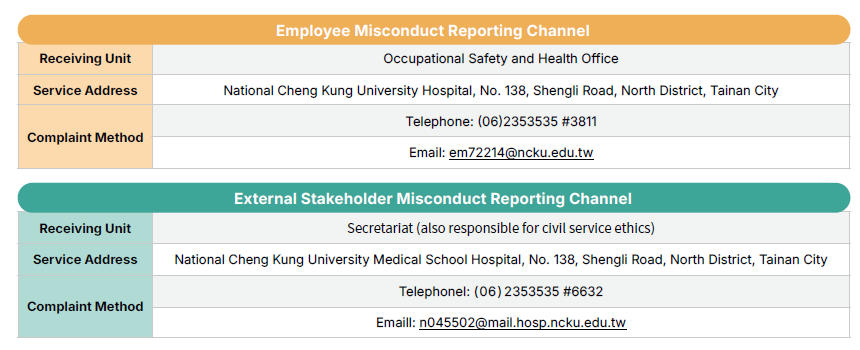
-
2024 AI Nurse Program
Faced with the dual challenges of a declining birthrate and an aging population in Taiwan, medical demands continue to rise while structural shortages in healthcare manpower pose serious threats to the stability of the medical system and the quality of patient care. Recognizing the critical importance of stable healthcare manpower for the sustainable development of medical services, NCKU Hospital has proactively implemented multiple strategies to attract, cultivate, and retain outstanding nursing talent.
To address issues such as nursing staff shortages, excessive working hours, and heavy workloads, NCKU Hospital collaborated with the “Cognitive Multimedia IC Design Laboratory” led by professors from the Department of Electrical Engineering at National Cheng Kung University. Together, they introduced smart technologies to clinical settings. Utilizing AIoTBR technology and the ChatGPT language model, the team developed a medical service robot and smart system equipped with eight major functions. The application areas include ward navigation, meal delivery logistics, drug identification, interactive dialogue with patients, and contactless physiological measurement services. These systems can be operated via computer or mobile platforms, offering both practicality and flexibility.
The smart robot and related application systems were implemented and field-tested in the 8A surgical ward of NCKU Hospital for over a year. Results showed that with smart technology assistance, the average daily time nurses spent on specific tasks dropped significantly from 100 minutes to under 33 minutes. Care efficiency improved more than threefold, and overall user satisfaction exceeded 90%.
As the trend of declining birthrates and aging continues, relying solely on young labor to support elderly care is no longer sustainable. The introduction of smart service robots provides the medical team with stable and effective support, not only enhancing care quality but also contributing to the sustainable development of the healthcare field.


Salary and Benefits
-
Compensation Policy
As a leading public medical center in Taiwan, NCKU Hospital upholds the principles of openness, fairness, and impartiality in establishing a comprehensive employment and compensation system. This system is based on the “Civil Servant Performance Evaluation Act,” the “Evaluation Guidelines for NCKUH Contracted Staff,” the “Guidelines for the Issuance of Year-End Bonuses for Military, Civil, and Teaching Staff,” and the “Implementation Guidelines for Incentive Bonuses for Hospitals Affiliated with National Universities under the Ministry of Education.” Salaries for civil servants (contracted attending physicians follow the same standards) comprise base pay, professional allowances, service incentives, and specialty duty bonuses. For contracted staff, salary scales for various job categories are set with reference to market rates and adjusted accordingly. Both civil servants and contracted staff receive annual pay raises and promotions based on performance evaluations. In addition, profit-sharing bonuses are issued depending on the Hospital’s operational status. The Hospital also complies with government policy by increasing the minimum wage and provides license bonuses or job stipends for specialized talent, as well as increased night shift stipends, retention bonuses, and long-service bonuses. The compensation system is continuously reviewed and optimized based on operational needs. The Hospital is committed to establishing a fair, reasonable, and competitive compensation and benefits system, with a comprehensive welfare framework covering health promotion, work-life balance, parenting support, recreational activities, and retirement care, thereby supporting employees’ needs at all life stages, enhancing well-being and organizational cohesion, and cultivating a workplace culture of sustainable prosperity.
The ratio of the annual total compensation of the highest-paid individual at the Hospital to the median of the annual total compensation for all other employees is approximately 11.88 times, a decrease of 1.69 times compared to the previous year. The ratio of standard salaries of entry-level female and male staff to the local minimum wage (NTD 27,470 in 2024) is 1.
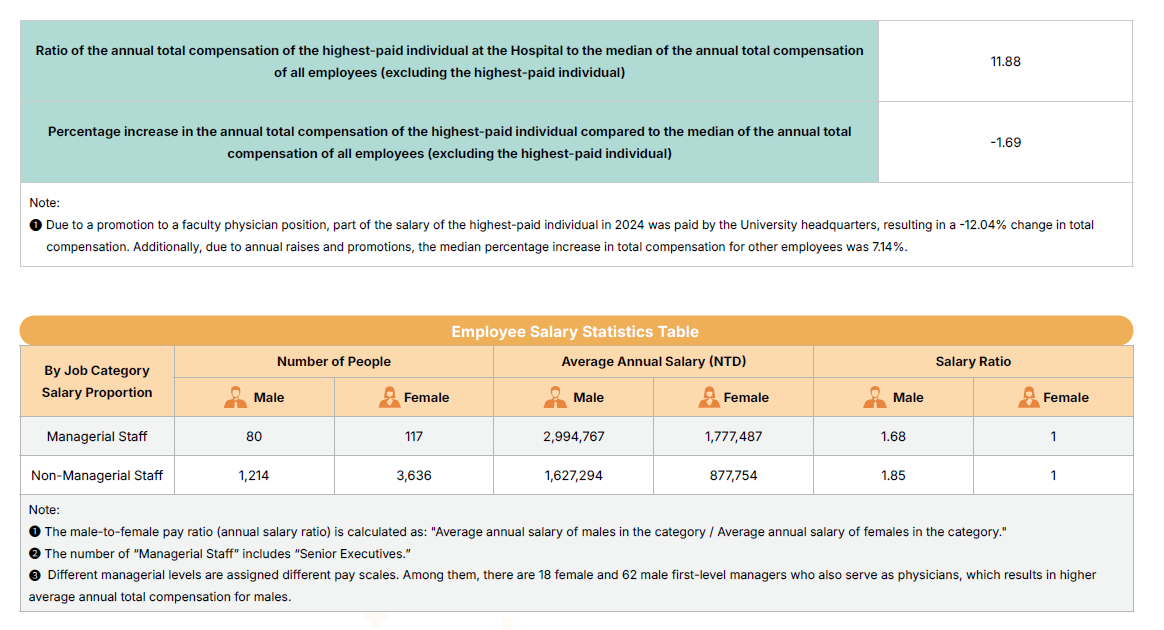
-
Comprehensive Employee Well-being
NCKU Hospital promotes career development plans, employee care initiatives, and retirement preparation support. These mechanisms help employees balance work and life, creating an attractive and sustainable career environment. This approach enhances overall organizational cohesion and long-term retention, embodying the core values of sustainable development for a healthcare institution.


NCKU Hospital provides staff dormitories, sports and recreational facilities, parking lots, and scheduled shuttle buses. It is also equipped with on-duty rest areas, designated nursing rooms, a hair salon, and a laundry service to support employees’ daily needs. Additionally, the Hospital collaborates with businesses at Minsheng Plaza to offer exclusive discounts for staff and provides access to group purchasing through cooperatives and special store offers to help reduce living expenses.
In terms of medical care, employees are entitled to waived registration fees, discounts on ward charges, and partial self-paid medical services, with preferential health check-up rates for themselves and their immediate family members. To promote physical and mental well-being as well as work-life balance, the Hospital regularly organizes staff trips, holiday events, and club subsidies. Art exhibitions and ticket discounts are also promoted to encourage participation and enrich workplace life.
-
Employee Care
NCKU Hospital provides employees with appropriate channels for feedback, psychological support and counseling mechanisms, and mental health education to help alleviate stress during difficult times. The Hospital has established a procedure for employee care and consolation. Upon receiving a care-related report, the supervisor of the relevant department conducts immediate care, followed by case intake by the Employee Care Support Team. If the employee requests psychological counseling, the Department of Psychiatry provides assistance according to the Employee Mental Health Counseling Service Procedure. All care cases are reviewed and followed up in quarterly meetings of the Care Support Team.
In addition, the Hospital has established comprehensive workplace support resources, including assistance with job adaptation, accessible facilities, human resources consultation, and psychological support services. A designated contact point is also available to handle related matters, ensuring that employee needs are promptly addressed and properly managed. Through the integration of internal resources and institutional support, the Hospital promotes equal employment and social inclusion, enabling all employees to grow and thrive in a safe and respectful workplace. The designated contact points are as follows.
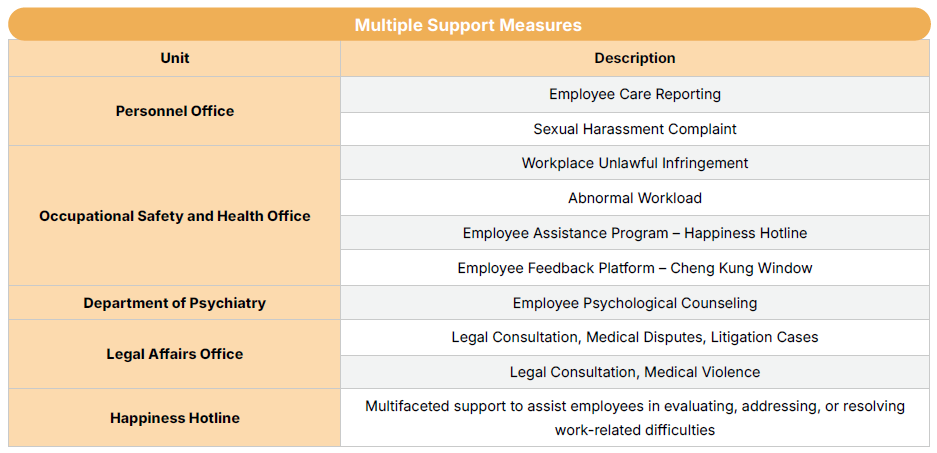
NCKU Hospital has established an Employee Assistance Program (EAP) and formed a dedicated EAP team to provide medical, legal, psychological counseling, and welfare resources. Each year, three free psychological counseling sessions and online consultations are offered to support employees in coping with workplace stress, occupational injuries, family matters, and maternity care. The Hospital also encourages continuing education by offering thesis incentive awards and has established public service selection pathways to support employees’ career development and well-being enhancement.
-
Promotion of Maternal Health Protection Policy for Workers
In accordance with Article 30 of the Occupational Safety and Health Act, the Hospital promotes a maternal health protection policy for workers, initiating protective measures for female employees who are pregnant or within one year postpartum. Occupational safety and health personnel, occupational health nurses, and on-site service physicians jointly conduct workplace and individual hazard assessments. Based on the results, hazard controls, work adjustments, and tiered management are implemented. The related control measures and assessment outcomes are communicated to the employee and their department supervisor, and are regularly reported and reviewed in the Occupational Safety and Health Committee. The Hospital has also established a reporting system and a leave inquiry system for maternal leave types, and actively performs cross-checks using the “Affidavit for Refusal of Chest X-ray Examination” to ensure effective implementation of the maternal health protection mechanism.
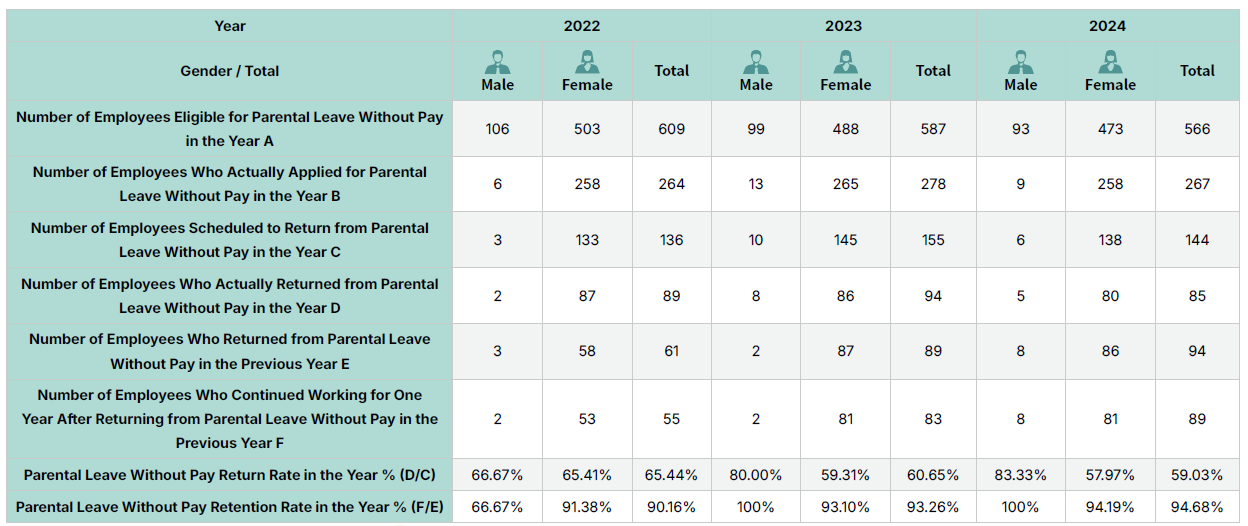
-
Secure Childcare, Happy Journey Begins
NCKU Hospital is committed to creating a family-friendly workplace that supports employees in balancing work and family responsibilities. A nursery center has been established to provide professional childcare services for employees’ children aged 0 to 2. In 2024, approximately 60 infants and toddlers were enrolled in the nursery center. Additionally, the Hospital has signed agreements with contracted nursery centers to offer employees discounted tuition rates, easing the financial burden on families and reducing commuting stress, enabling staff to focus on their work with greater peace of mind.
In the future, the Hospital will continue expanding accessibility and diversity of childcare resources by entering into agreements with more contracted service providers. At the same time, it will eliminate concerns among employees that applying for parenting benefits might negatively affect performance evaluations or promotion prospects. The Hospital will enhance supervisors’ awareness of work–life balance and offer flexible work arrangements and emotional support in routine or emergency situations. These concrete actions aim to enhance employee happiness and strengthen their sense of commitment to the organization.

Assisting Career Development
-
Strengthening Professional Advancement and International Learning Support
In response to the rapidly changing medical environment and patient needs, NCKU Hospital has established a comprehensive hospital-wide training program based on the “Basic Employee Education and Training Program” and the “Holistic Care Education and Training Program.” This initiative actively promotes the concept of holistic care, cultivating employees with the capability to provide integrated and patient-centered services grounded in compassion and humanistic concern.
To encourage lifelong learning and enhance workplace competitiveness, in-service staff are provided with systematic general training across seven major categories: General Humanities and Administrative Education, Information Security and Personal Data Protection, Medical General Knowledge, Healthcare Quality and Patient Safety, Infection Control, Emergency and Disaster Response, and First Aid Training. These programs comprehensively strengthen employees’ professional competencies and response capabilities. In addition, the Hospital offers diverse learning channels through in-person courses and digital learning platforms to accommodate different learning preferences and schedules.
NCKU Hospital convenes employee education and training meetings every six months to regularly track course satisfaction, completion rates, and implementation effectiveness. An overall satisfaction and needs assessment survey is conducted at the end of each year. To ensure effective execution, the Hospital adopts the PDCA cycle and Kirkpatrick Model to systematically evaluate and continuously improve the training courses.
Through diversified and structured learning methods, employees’ professional knowledge, clinical skills, and interdisciplinary communication and collaboration abilities are effectively enhanced. With a continuously optimized training mechanism, the Hospital is committed to improving overall care quality and delivering medical services that are safe, compassionate, and rooted in holistic concern for every patient. A summary of training programs is provided in the table below:
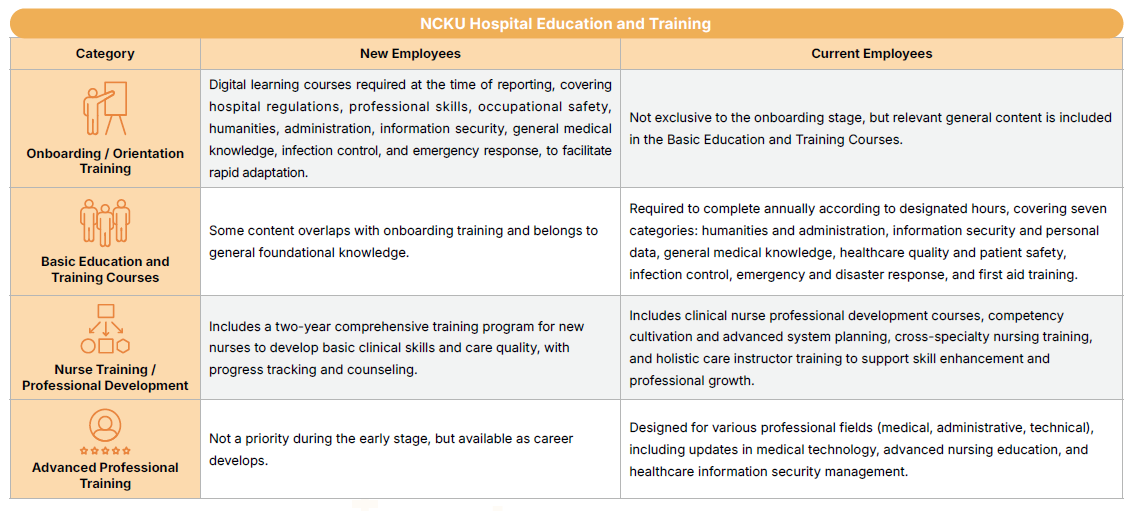
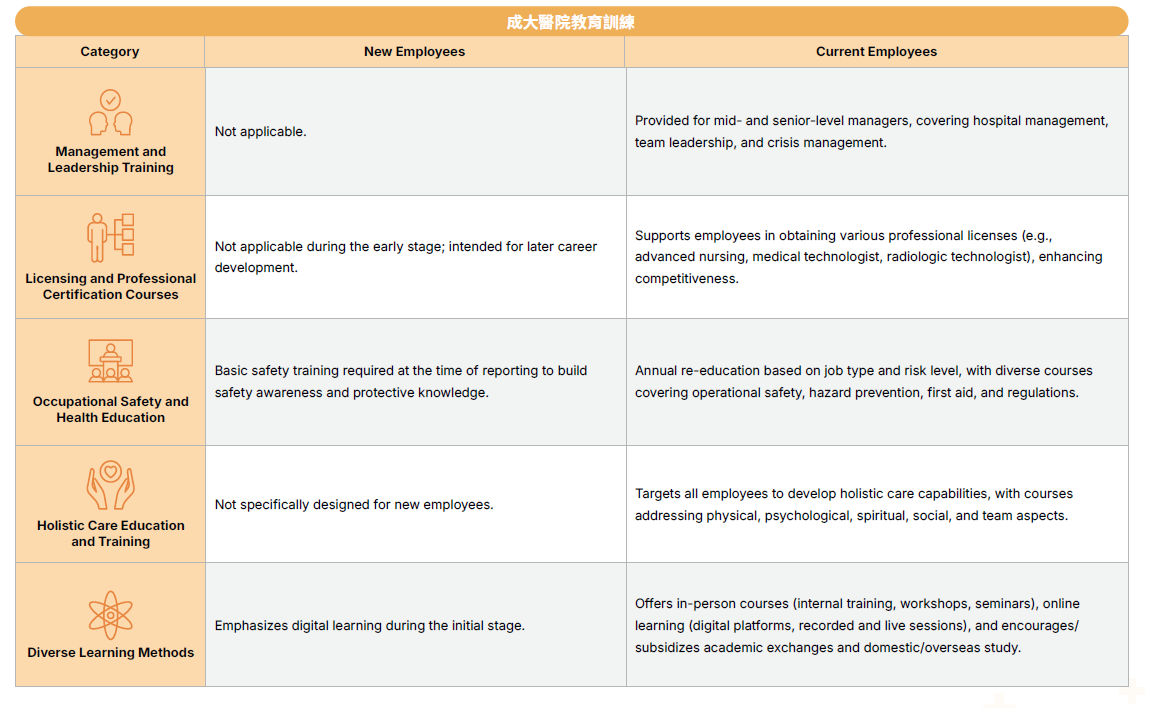


-
Employee Retirement System and Implementation Status
NCKU Hospital handles employee pension contributions and retirement matters in accordance with the Civil Servant Retirement, Severance, and Compensation Act, the Labor Standards Act, and the Labor Pension Act. The Hospital places high importance on the quality of life and career transition for retired employees. In addition to encouraging retired employees to participate in in-hospital volunteer training programs to maintain social connections, comprehensive retirement planning and support measures are provided. The Hospital also holds retirement financial and career planning courses from time to time to help employees understand pension planning, insurance, and investment management.
For employees approaching retirement or career change, the Hospital offers re-employment and skill transition training, such as developing them into medical consultants or educational instructors to continue their professional value and contribution. Senior retired personnel may be rehired for short-term assignments depending on talent cultivation and operational needs, enabling knowledge transfer and sustainable organizational development.
The Hospital also offers health management courses and psychological counseling services to continuously monitor the physical and mental well-being of employees, helping them transition smoothly into retirement life.
Additionally, NCKU Hospital provides care and recognition for retired employees through Lunar New Year gifts, medical privileges, and commemorative retirement coins.


